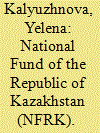| Srl | Item |
| 1 |
ID:
109705


|
|
|
|
|
| Publication |
2011.
|
| Summary/Abstract |
Sovereign Wealth Funds (SWF) have different titles, goals and rules, but they share the underlying objective of helping governments deal with the problems created by large and variable revenues (mainly from energy or other commodity related sectors). In Kazakhstan, such a fund (the National Fund of the Republic of Kazakhstan (NFRK)) was established in 2000. This fund operates as both a stabilisation and a savings fund. The first test for the NFRK was 2007-2009 financial crisis, where the NFRK "saved" the economy and guarantied its speedy recovery. The paper analyses the NFRK's operation up to 2007 and during the crisis years 2007-9, before drawing conclusions and implications for the future. Between 2001 and 2007 the NFRK conservatively accumulated assets, which proved to be useful in limiting the impact of the post-2007 crisis. However, the pre-2007 experience indicated structural weaknesses associated with discretionary executive authority and non-transparency. The paper concludes by observing that this history has created significant challenges for the future.
|
|
|
|
|
|
|
|
|
|
|
|
|
|
|
|
| 2 |
ID:
092788


|
|
|
|
|
| Publication |
2009.
|
| Summary/Abstract |
This paper analyses the connection between resource nationalism and financial sector intervention in the FSU countries. We consider recent financial development in the FSU and the special features of energy rich emerging economies (Russia and Kazakhstan, in particular) which are influencing recent credit expansions. We find that the hydrocarbon sector has boosted boosting domestic credits through a number of direct and indirect routes. Recent decline in oil prices may change government attitudes to a continued resource nationalist strategy. Sovereign wealth funds that were established in a majority of energy rich emerging economies may, to the extent that they enable the selection of winners in specific economic sectors, create path dependency or exacerbate longer term allocative inefficiency arising from the governance structure associated with resource nationalism.
|
|
|
|
|
|
|
|
|
|
|
|
|
|
|
|